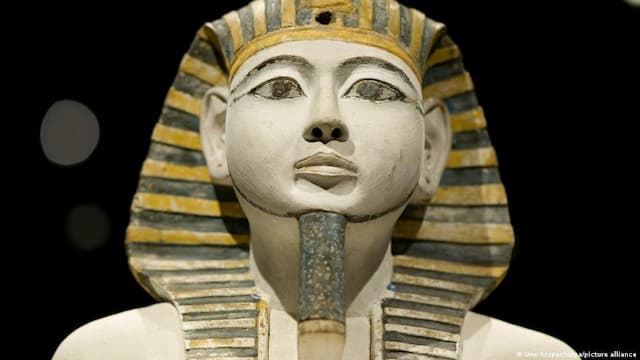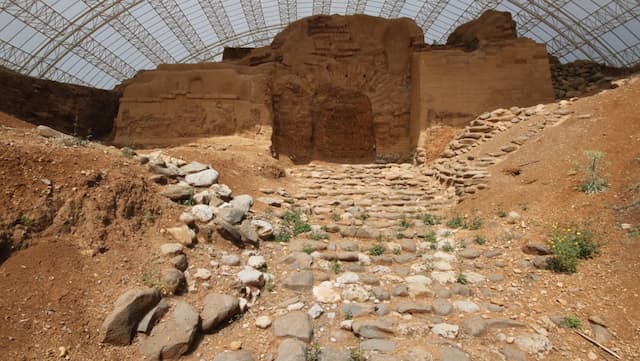The meaning of the cross (Matthew 27:32–44)
Why does Matthew tell the story of the cross as he does? Should we have the same emphasis when we talk about the cross?
There are so many ways to talk about the cross, the centre of our faith. So, why does Matthew tell the story of the cross the way he does? Does he have a consistent message? What is it?
Matthew 27:32–44 (my translation, compare NIV)
32 As they made their way, they found a Cyrenean named Simon, pressing him into service to take up his cross. 33 Arriving at the place called Golgotha (literally, Skull Place) 34 they gave him a drink: wine mixed with gall. Tasting it, he did not want to drink it. 35 Crucifying him, they divided his clothes by throwing dice, 36 sitting as they guarded him there. 37 Over his head they placed his crime: “This is Jesus, the King of the Jews.” 38 Next, they crucify with him two criminals, one on his right, one on his left.
39 Those passing by were slandering him, shaking their heads and saying, 40 “You’re the one demolishing the temple and building it in three days? Well, save yourself if you are the son of God; step down from the cross!”
41 The high priests joined in the derision, along with the Bible scholars and elders: 42 “He saved others; but he isn’t able to save himself. If he is the King of Israel, let him come down now from the cross and we’ll give him our allegiance. 43 Since he’s been relying on God, let God rescue him now — if he wants him. For that’s what he claimed, ‘I am God’s son.’”
44 In the same way, the criminals crucified with him were ridiculing him.
Matthew focuses on four groups who all scorn Jesus for his kingship claims:
- Soldiers: King of the Jews (v. 37)
- Compatriots passing by: Temple demolisher/builder. Son of God (v. 40).
- Jerusalem authorities: King of Israel, son of God (vv. 42-43)
- Crucified criminals: same ridicule (v.44).
Two phrases are repeated: king of Jews/Israel, son of God. As we’ve explained, these two phrases meant the same thing to the Jewish people. Neither the passers-by nor the Jerusalem authorities understood the doctrine of the trinity (Father, Son, and Spirit): that is not what son of God meant on their lips.
Son of God was a kingship term. The Davidic king was the prince (son of the heavenly sovereign) reigning on earth with the authority of his Father in heaven. That’s how God established David’s kingship: I will be his father, and he will be my son (2 Samuel 7:14). As each Davidic king was crowned, God made this decree: You are my son; today I have become your father (Psalm 2:7).
So, all four groups Matthew describes are focused on Jesus’ kingship:
- The soldiers have already been mocking Jesus’ kingship (27:27-31). Now they commit it to writing (v. 37).
- One week earlier, his compatriots lauded the Davidic king who would save them (21:9). Now they mock the king who cannot even save himself (v. 40).
- The Jerusalem authorities condemned him for his claim to be God’s anointed king (the Christ, the son), a claim they considered blasphemous (26:59-66). Now they deride him for his belief that God would raise him up as king (vv. 42-43).
- The criminals were positioned beside him, possibly as mock attendants of the king (v. 38). They find his royal status as ludicrous as everyone else (v. 44).
Jesus’ kingship is the single motif in Matthew’s description of the cross. That’s the meaning of the cross: the world disposing of its king. United in their rejection of God’s anointed ruler are: the Empire’s military forces (soldiers), the people of God’s nation (his compatriots), the leaders called to represent God (high priests), and the condemned criminals. The cross is the rejection of divine kingship in his anointed.
Conclusion
There are many ways to talk about the cross, many theories of the atonement. The New Testament uses a range of these. We can view the cross through the framework of Old Testament sacrifices and ceremonies (as Hebrews does). We can view it as a place of judgement (justification). We can view it as a penalty Jesus bore on our behalf (penal substitution). We can view it as God making peace between heaven and earth (reconciliation). We can view it as the ultimate expression of sin and rebellion against God (assassinating his Son).
But perhaps we miss the main point if we don’t see it as an expression of divine kingship.
The kingdom of God was at the heart of everything for Jesus, the core of his theology. Heaven’s reign over the earth was his message, his gospel (Matthew 4:17; 9:35; 24:14). It was when the disciples recognized him as God’s anointed ruler that Jesus began to explain that those in power would put him to death (16:21; 17:22; 20:18).
According to Matthew, the cross is the rejection of God’s kingship in God’s anointed. The entire Gospel is the story of how the anointed son of David (1:1) receives all authority (28:18-20).
So, is this crucial perspective for understanding the cross? Is it primarily the human rejection of the divinely appointed king? Is that what Matthew is telling us?
If so, the cross is the most astounding revelation of the character of God, of how he exercises his sovereign kingship. It might be enough to make us rethink our theology of God and his sovereignty.
What others are saying
Craig S. Keener, The Gospel of Matthew: A Socio-Rhetorical Commentary (Grand Rapids, MI: Eerdmans, 2009), 682:
The language of the priestly mockers probably also echoes Wisdom 2:18 in the Septuagint: “For if the righteous man is a son of God, God will help him, and deliver him from the hand of those who resist him.” In the Wisdom of Solomon, those who utter these words are the wicked who want to condemn the righteous to death unjustly, because he claims to be a child of God and to have a good future (2:16–20). In other words, by their own words Jesus’ enemies are condemned (Mt 12:37; cf. Lk 19:22). The King of the Judeans refuses to respond (5:39; cf. Is 53:7).
Again irony saturates the narrative: they are right that he cannot save himself if he would save others (27:42). That they offer to believe if he will come down, just as Satan offered him the kingdom if he would bow down, tests Jesus: he can have people’s allegiance if he will just forsake the Father’s way of getting it (26:39, 42).
Tom Wright, Matthew for Everyone, (London: SPCK, 2004), 2:182–183:
What for Pilate and the soldiers was Jesus’ ‘crime’ — his claim to be Israel’s true king — was for Matthew the sober truth. And the crucifixion was the means by which his kingdom would be established. As he had said to James and John (20:23), there would come a time when he would indeed be enthroned with one person on his right and another on his left; but the throne he had in mind was the cross.
Why? Because the kingdom Jesus had spoken of, from the Sermon on the Mount onwards, was never a kingdom to be established and maintained by military force. If it was to be God’s kingdom, it would come about by God’s means; and the means that the true God chooses to use are the means of self-giving love.
Related posts
- How Jesus explained the cross (Mt 20:17-19)
- Why did Jesus have to die? (Mt 26:47-56)
- The folly of the cross
- The counter-intuitive wisdom of the cross
Seeking to understand Jesus in the terms he chose to describe himself: son of man (his identity), and kingdom of God (his mission). Riverview Church, Perth, Western Australia
View all posts by Allen Browne










